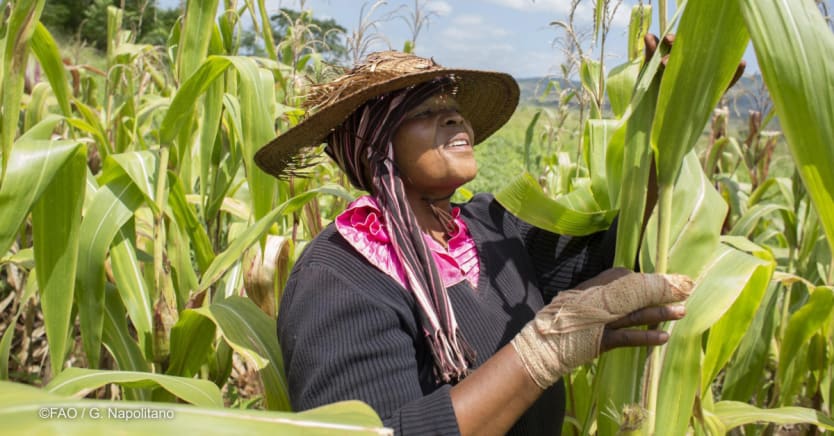
Land. It is a commodity like no other. We live on it. We grow from it. We drink from it and build our futures upon it. But — increasingly and frighteningly so — we don’t share it equally.
The distribution of land has long defined the gap between the rich and poor. Now, new data shows clearer than ever how the way in which land is being shared and managed profoundly impacts extreme and rising inequality and the achievement of women’s and girl’s rights.
With the largest 1% of farms operating more than 70% of the world’s farmland, it is time that we call out the problem of extreme land inequality. And commit to ending it.
The land grab by the wealthiest squeezes value into ever fewer hands. At every step, we see how this grab takes away from the people who have a sustainable connection with the land — and whose expertise, long-term planning, and diversity of crops and methods are unparalleled.
We’re talking about women smallholder farmers, who contribute to food security and nutrition of their families and communities.
According to the Food and Agriculture Organization, if women and men had the same access to resources, including land, it is estimated that agricultural yields would rise by almost a third, resulting in potentially 150 million fewer hungry people in the world.
Addressing land inequality must begin with rebalancing power in favor of women. The rural women, working as farmers, wage earners, and entrepreneurs, comprise no less than a quarter of the world’s population,
Here are five initial steps key actors can take toward solving land and gender inequality.
Stand in solidarity with women
From household decision-making to traditional community practices, national enforcement of laws to international policy, rural and Indigenous women have long fought for change.
Solutions begin by standing in solidarity with these women. We need a culture shift that embraces — not resists — women’s ability to shape the governance of natural resources.
Recognize that land inequality perpetuates the gender gap
Land inequality is significantly higher than what we know: A trend that directly threatens the livelihoods of 2.5 billion people involved in smallholder agriculture and food production.
Rural and Indigenous women see their land and territories as an extension of themselves and thus equate violence against their land with violence against their bodies.
—Local agri-food systems — composed of small-scale producers and family farmers connected to particular pieces of land but often not with secure rights to that land — are under pressure in an increasingly unequal global food system largely controlled by a small number of corporations and financial institutions.
Women, who on average comprise 43% of the agricultural labor force, yet own less than 15% of the world’s land, suffer most from the consequences of this inequality. When they do own land, it’s usually of poorer quality and on smaller plots.
This problem isn’t confined to the developing world. In the EU, for example, women’s agriculture holdings are barely more than a third compared with that of men.
Without secure land rights, women are also vulnerable to land grabbing, domestic violence, and forced marriage if they remain widowed — deepening the cycle of inequality.
While rural women may feed their families, communities, and beyond, they’re growing food on somebody else’s land.
Rebalancing power by recognizing women’s leadership
In many parts of the world, traditional norms prevent women from participating in the same decision-making spaces as men. One of these rights includes the right to own, use, and make decisions on their land on equal terms with men. Although 164 countries legally recognize this globally, only 52 countries guarantee these rights in practice.
Governments must do better. They must invest in and ensure equal representation and leadership of rural and Indigenous women in land governance, management, restoration, and administration structures so they can share their experiences and push for their demands.
And clearly and specifically, we need to see governments providing legal recognition of tenure rights, including customary and Indigenous people’s rights, making efforts to address gender inequalities in access, control, and ownership of land and natural resources.
Governments must make good on their commitments
In 2015, 193 world leaders pledged to “leave no one behind” ensuring a better world in 2030 by setting targets for a sustainable, peaceful, and prosperous future. The Sustainable Development Goals are an inspiring vision that promises voices will be heard and full participation and genuine democracy guaranteed.
Six years in, governments are not making good on their promise nor being transparent on their progress — where it exists. In 2020, only 7 out of 47 countries reported on land rights targets. Only five countries made mention of women’s land rights.
Governments must protect women’s land and territorial rights — and meet land rights targets in the SDGs, especially by providing and enforcing legal frameworks that guarantee women’s equal rights to land ownership and control. It will require strong political commitment, backed by dedicated resources.
Zero tolerance toward violence against women
Rural and Indigenous women see their land and territories as an extension of themselves and thus equate violence against their land with violence against their bodies.
How climate change and gender-based violence are connected
As donors begin to explore the links between environmental issues and GBV, experts say "we can't close our eyes" to the issue anymore.
When land rights are threatened, women’s rights are threatened, too, pushing them further to the margins. Governments and companies must play their role — including ensuring zero tolerance toward the exploitation of and violence against the women who work across their supply chains.
Frameworks and standards such as the Convention on the Elimination of All Forms of Discrimination Against Women and the United Nation’s “Guiding Principles on Business and Human Rights” — provide a blueprint to respect and comply with human rights principles.
Leading women’s rights, land rights, multilateral, international, and national organizations — including UN Women, U.N. Human Settlement Programme, International Fund For Agricultural Development, and the International Land Coalition — recently came together to set out an agenda committed to women’s land rights.
It is clear that a bold agenda exists — and it now requires the political will from leaders. Achieving land rights and addressing the underlying inequalities that undermine those rights must now be our collective priority if we are to rebuild the world anew, sustainably, and more equally in the wake of COVID-19.









